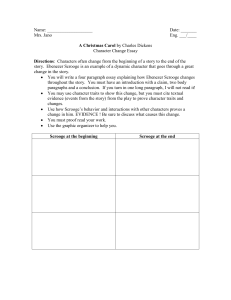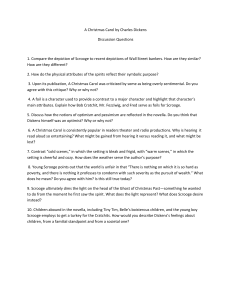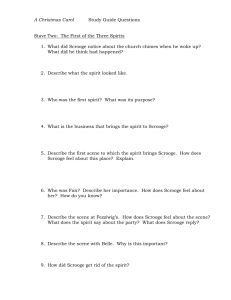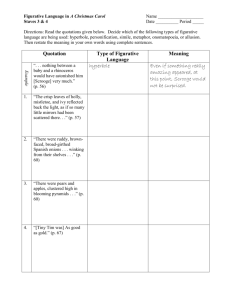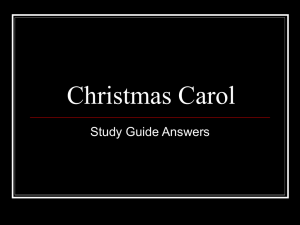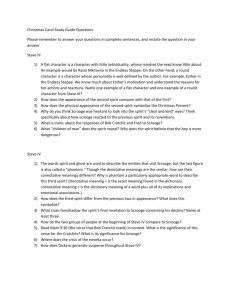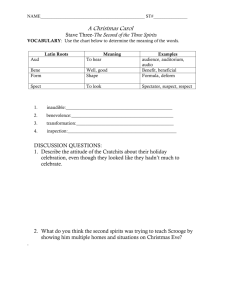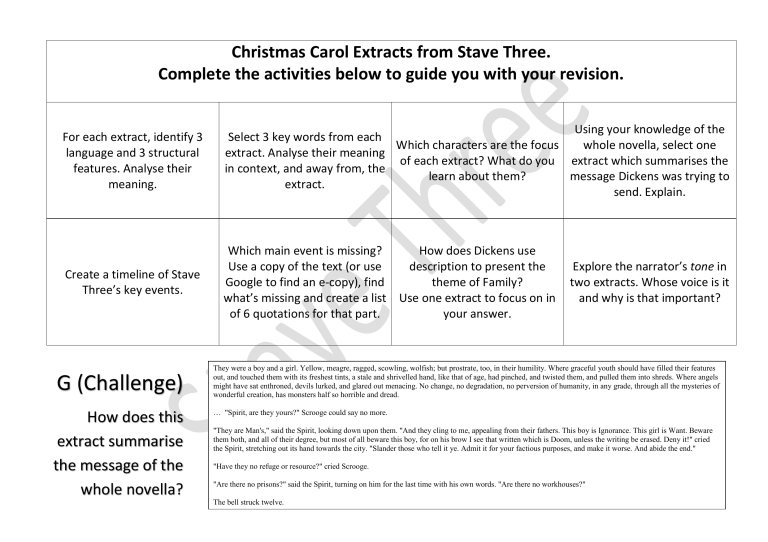
Christmas Carol Extracts from Stave Three. Complete the activities below to guide you with your revision. For each extract, identify 3 language and 3 structural features. Analyse their meaning. Using your knowledge of the Select 3 key words from each Which characters are the focus whole novella, select one extract. Analyse their meaning of each extract? What do you extract which summarises the in context, and away from, the learn about them? message Dickens was trying to extract. send. Explain. Create a timeline of Stave Three’s key events. Which main event is missing? How does Dickens use Use a copy of the text (or use description to present the Google to find an e-copy), find theme of Family? what’s missing and create a list Use one extract to focus on in of 6 quotations for that part. your answer. G (Challenge) How does this extract summarise the message of the whole novella? Explore the narrator’s tone in two extracts. Whose voice is it and why is that important? They were a boy and a girl. Yellow, meagre, ragged, scowling, wolfish; but prostrate, too, in their humility. Where graceful youth should have filled their features out, and touched them with its freshest tints, a stale and shrivelled hand, like that of age, had pinched, and twisted them, and pulled them into shreds. Where angels might have sat enthroned, devils lurked, and glared out menacing. No change, no degradation, no perversion of humanity, in any grade, through all the mysteries of wonderful creation, has monsters half so horrible and dread. … "Spirit, are they yours?" Scrooge could say no more. "They are Man's," said the Spirit, looking down upon them. "And they cling to me, appealing from their fathers. This boy is Ignorance. This girl is Want. Beware them both, and all of their degree, but most of all beware this boy, for on his brow I see that written which is Doom, unless the writing be erased. Deny it!" cried the Spirit, stretching out its hand towards the city. "Slander those who tell it ye. Admit it for your factious purposes, and make it worse. And abide the end." "Have they no refuge or resource?" cried Scrooge. "Are there no prisons?" said the Spirit, turning on him for the last time with his own words. "Are there no workhouses?" The bell struck twelve. B E The house fronts looked black enough, and the windows blacker, contrasting with the smooth white sheet of snow upon the roofs, and with the dirtier snow upon the ground; which last deposit had been ploughed up in deep furrows by the heavy wheels of carts and wagons; furrows that crossed and recrossed each other hundreds of times where the great streets branched off, and made intricate channels, hard to trace in the thick yellow mud and icy water. The sky was gloomy, and the shortest streets were choked up with a dingy mist, half thawed, half frozen, whose heavier particles descended in shower of sooty atoms, as if all the chimneys in Great Britain had, by one consent, caught fire, and were blazing away to their dear hearts" content. There was nothing very cheerful in the climate or the town, and yet was there an air of cheerfulness abroad that the clearest summer air and brightest summer sun might have endeavoured to diffuse in vain. C And now, without a word of warning from the Ghost, they stood upon a bleak and desert moor, where monstrous masses of rude stone were cast about, as though it were the burial-place of giants; and water spread itself wheresoever it listed -- or would have done so, but for the frost that held it prisoner; and nothing grew but moss and furze, and coarse rank grass. Down in the west the setting sun had left a streak of fiery red, which glared upon the desolation for an instant, like a sullen eye, and frowning lower, lower, lower yet, was lost in the thick gloom of darkest night. "What place is this?" asked Scrooge. "A place where Miners live, who labour in the bowels of the earth," returned the Spirit. "But they know me. See." F "I was only going to say," said Scrooge's nephew," that the consequence of his taking a dislike to us, and not making merry with us, is, as I think, that he loses some pleasant moments, which could do him no harm. I am sure he loses pleasanter companions than he can find in his own thoughts, either in his mouldy old office, or his dusty chambers. I mean to give him the same chance every year, whether he likes it or not, for I pity him. He may rail at Christmas till he dies, but he can't help thinking better of it -- I defy him -- if he finds me going there, in good temper, year after year, and saying Uncle Scrooge, how are you. If it only puts him in the vein to leave his poor clerk fifty pounds, that's something; and I think I shook him yesterday." Then up rose Mrs Cratchit, Cratchit's wife, dressed out but poorly in a twice-turned gown, but brave in ribbons, which are cheap and make a goodly show for sixpence; and she laid the cloth, assisted by Belinda Cratchit, second of her daughters, also brave in ribbons; while Master Peter Cratchit plunged a fork into the saucepan of potatoes, and getting the corners of his monstrous shirt collar (Bob's private property, conferred upon his son and heir in honour of the day) into his mouth, rejoiced to find himself so gallantly attired, and yearned to show his linen in the fashionable Parks. And now two smaller Cratchits, boy and girl, came tearing in, screaming that outside the baker's they had smelt the goose, and known it for their own; and basking in luxurious thoughts of sage and onion, these young Cratchits danced about the table, and exalted Master Peter Cratchit to the skies, while he (not proud, although his collars nearly choked him) blew the fire, until the slow potatoes bubbling up, knocked loudly at the saucepan-lid to be let out and peeled. D "God bless us every one!" said Tiny Tim, the last of all. He sat very close to his father's side upon his little stool. Bob held his withered little hand in his, as if he loved the child, and wished to keep him by his side, and dreaded that he might be taken from him. "Spirit," said Scrooge, with an interest he had never felt before,"tell me if Tiny Tim will live." "I see a vacant seat," replied the Ghost, "in the poor chimney-corner, and a crutch without an owner, carefully preserved. If these shadows remain unaltered by the Future, the child will die." "No, no," said Scrooge. "Oh, no, kind Spirit. Say he will be spared." "If these shadows remain unaltered by the Future, none other of my race," returned the Ghost, "will find him here. What then? If he be like to die, he had better do it, and decrease the surplus population." A The moment Scrooge's hand was on the lock, a strange voice called him by his name, and bade him enter. He obeyed. It was his own room. There was no doubt about that. But it had undergone a surprising transformation. The walls and ceiling were so hung with living green, that it looked a perfect grove; from every part of which, bright gleaming berries glistened. The crisp leaves of holly, mistletoe, and ivy reflected back the light, as if so many little mirrors had been scattered there; and such a mighty blaze went roaring up the chimney, as that dull petrifaction of a hearth had never known in Scrooge's time, or Marley's, or for many and many a winter season gone. Heaped up on the floor, to form a kind of throne, were turkeys, geese, game, poultry, brawn, great joints of meat, sucking-pigs, long wreaths of sausages, mince-pies, plum-puddings, barrels of oysters, red-hot chestnuts, cherry-cheeked apples, juicy oranges, luscious pears, immense twelfth-cakes, and seething bowls of punch, that made the chamber dim with their delicious steam. In easy state upon this couch, there sat a jolly Giant, glorious to see:, who bore a glowing torch, in shape not unlike Plenty's horn, and held it up, high up, to shed its light on Scrooge, as he came peeping round the door. "Come in!" exclaimed the Ghost. "Come in, and know me better, man." Scrooge entered timidly, and hung his head before this Spirit. He was not the dogged Scrooge he had been; and though the Spirit's eyes were clear and kind, he did not like to meet them.
